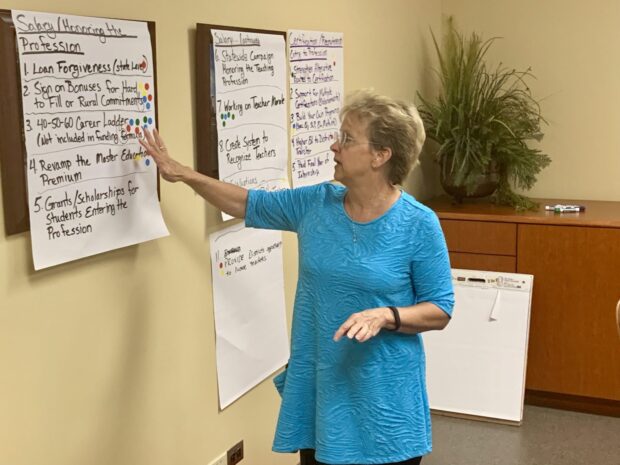A K-12 task force subcommittee finished up its work Thursday following a passionate discussion about teacher evaluations.
The educator pipeline subcommittee of Gov. Brad Little’s “Our Kids, Idaho’s Future” task force finalized two recommendations:
- Increasing pay for veteran educators by building out the career ladder salary program, including a third rung that pays out $60,000. The subcommittee was pretty clear that this buildout would likely take place over multiple years, because of limited financial resources.
- Continuing to expand statewide professional development efforts to help educators grow professionally, feel supported and have the expertise to improve student achievement.
Teacher evaluations were also a focal point during Thursday’s meeting. Evaluations have become increasingly high stakes — and controversial — after the Legislature partially tied the amount of money it sends to school districts for teacher pay to a evaluations.
Last month, Idaho Education News reported 98 percent of Idaho’s nearly 19,000 teachers earned one of the top two overall scores on their annual evaluations.
“When you see in the news Nampa has 98 percent of teachers proficient, that doesn’t mean they’re perfect, it doesn’t mean they have no room for growth and it doesn’t mean we have been poor in our ability to assess,” Nampa district Superintendent Paula Kellerer said Thursday.
In Nampa, administrators and teachers view evaluations as a valuable coaching tool and have deep discussions about ways teachers can improve their craft, Kellerer said. Because the evaluation tool includes 22 different components, she said, many teachers earn lower scores on some components but still earn overall proficient scores “based on a preponderance of the evidence that says proficient.”
Rep. Gary Marshall, R-Idaho Falls, worried the Legislature may have unintentionally created a financial incentive for administrators to report that all educators are proficient.
Districts negotiate pay every year and are bound by contracts to pay out what they negotiate, regardless of teacher performance. However, the state sends out more money to local districts for pay if teachers post two years’ worth of proficient evaluations and jump to the second professional rung of the career ladder. On the other hand, if administrators report having more teachers rated as basic or unsatisfactory, these teachers do not meet the criteria to climb the career ladder, and the state sends the school less money.
“There is pressure to say ‘proficient’ so they get the money,” said Marshall, emphasizing he was speaking from a legislator’s perspective. “That creates a significant problem on our part.”

Subcommittee chair Shawn Keough, a former state senator, said the subcommittee will issue a secondary recommendation to improve the evaluations system through tweaks. Several subcommittee members talked about increasing the validity of teacher evaluations, ensuring they are used as coaching and growth tool and finding more ways to differentiate between teacher performance, but the subcommittee stopped short of recommending specific tweaks or changes.
Meanwhile, three other subcommittees have spent the summer developing recommendations. None of them are finalized yet, but other potential recommendations include:
- Creating a new school accountability system based around growth in K-3 literacy rates, as measured by the Idaho Reading Indicator, factoring in a school’s demographic characteristics.
- Offering optional, all-day kindergarten.
- Increasing the balance of state savings accounts, and minimizing future withdrawals, in order to help soften the impact of a potential economic recession.
The educator pipeline subcommittee was the first to wrap up its work and approve recommendations for the full task force. The other subcommittees are expected to finish their work next week.
The full “Our Kids, Idaho’s Future” task force meets next Oct. 1 in Moscow.
